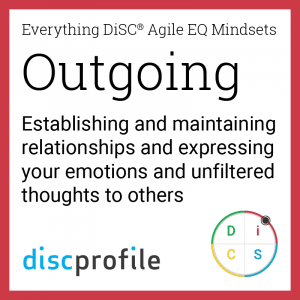Are you naturally outgoing? Outgoing is one of the eight Agile EQ mindsets, and tends to align with i styles. This article will help you understand your outgoing disposition, and how it may either benefit or limit you, depending on the situation.
All DiSC® styles are able to call upon an outgoing frame of mind when needed. If it is an attitude that takes more effort for you, get tips for gaining comfort with it in How to be more outgoing.
“I reach out to others.”
For people with outgoing mindsets, it’s about connection—everyone is a potential friend. They reach out, initiating social and professional contacts. They prioritize relationships and make space for people even when they’re busy.
Outgoing people are more willing than others to let their guard down and speak in an unfiltered way, building trust and making it easier for others to open up as well. They are candid and generally self-confident, saying what they’re really thinking. These folks often project an upbeat and welcoming attitude that brings people together and makes them feel included.
Benefits of the outgoing mindset
Whether the outgoing mindset is natural for you or takes effort, you can benefit from using it. Being outgoing allows you to:
- create stronger, more rewarding relationships
- build trust and open channels of communication
- develop a network of allies you can draw on for support
- foster a sense of camaraderie and inclusion
- energize those around you with your optimism and team spirit
- understand other people better (and misunderstand them less)

Which needs drive the outgoing mindset?
Each of the eight Agile EQ mindsets is built upon the needs it satisfies. People with naturally outgoing outlooks feel comfortable in that space because it helps them meet their need for:
- connection
- a friendly environment
- acceptance
- social influence
- being at the center of the action
Limitations of the outgoing mindset
When you feel comfortable in a certain mindset, you often forget that there are other options for how to approach a given situation. If you rely too much on being outgoing, rather than adapting to the situation, you might:
- press people to open up before they are ready
- be overly trusting
- overshare in ways you later regret
- focus so much on relationships you neglect other responsibilities
- overvalue a friendly atmosphere when a bit of conflict could be productive
- be overly blunt, potentially alienating people
- monopolize conversations
Growing your emotional agility
Being outgoing has probably worked well for you in many situations. But perhaps you can think of times when a different approach may have produced a better result. Understanding your intuitive mindsets is the first step toward emotional agility. Then, you can learn about other dispositions. This not only helps you better understand your coworkers but also gives you more options for how to react to a situation.
The Everything DiSC® Agile EQ™ assessment steps you through this process of developing your EQ. You can use it when working with a leadership or life coach, a mentor, or an accountability partner. As with any skill, regular practice is the surest way toward results.
See also: How to be more outgoing

